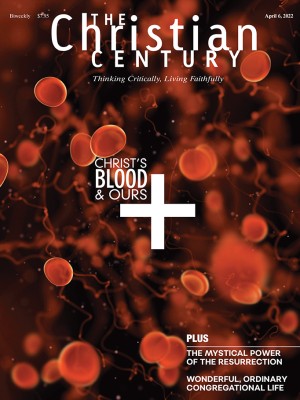April 14, Maundy Thursday (John 13:1-17, 31b-35)
In a pandemic, the practices associated with Maundy Thursday feel nearly transgressive.
The older members of the parish I serve have a long-standing practice of gathering monthly for lunch and fellowship. The meals are seasonal, sometimes simple, occasionally catered, and always critical to inspiring conversation and the sharing of life’s gifts and challenges.
When the pandemic became a more than lingering reality, those senior lunches moved, like so much of what we did, online. In our digital cubes, from our physical cubicles, we gathered to speak of the special difficulties of the moment. But something was off. As we munched on our home-assembled lunches, we were sharing, but the luster of intimacy had been dulled. It was not yet safe to gather some of our most vulnerable people in person, but we needed more from our experience together.
Read our latest issue or browse back issues.
Intimacy through food was what we needed. When possible, we began cooking, portioning, and delivering a homemade meal to participating seniors and then sharing that lunch together online. And while not all the intimacy of gathering was reclaimed, something about sharing the same food opened us up to one another again. The sharing of common smells, tastes, and textures cements community in unique ways. Shared meals, even from a distance, have power. Their intimacy is undeniable.
Maundy Thursday is a day of just such impossible intimacies. I say impossible because in these years of fear of illness, the practices associated with Maundy Thursday feel nearly transgressive. Both the assigned Gospel and many liturgical traditions call forth the sharing of food and drink and the washing of feet. These are intimate acts under “normal” circumstances.
Jesus’ gathering with his disciples this night is awash in such intimacy. He is intimate with his Parent’s intentions for his imminent death and resurrection. He is intimate with Judas’s intentions and has made peace with the role his betrayal will play in what is to come. Jesus is intimate with his friends, disrobing in their presence and free with his touch in washing them. Jesus is intimate with his words about love that persists to the end for little children with whom he has shared his life and ministry.
As the great triduum begins, Maundy Thursday centers holy intimacy. For Jesus, Passover will be marked not by intimate storytelling, remembrance, and meals but in suffering in solidarity with all who are harmed by miscarriages of justice. Though many communities don’t welcome nearly the same volume of worshipers for Maundy Thursday as they will for Easter or even Good Friday, this day has a crucial role to play as an intimate gathering of disciples at the feet and table of the Good Shepherd.
How such intimacy is practiced isn’t and shouldn’t be uniform across traditions, churches, or communities. Theologies abound, not to mention the unpredictability of pandemic mitigations by location and context. But the need for spiritual intimacy in the midst of Holy Week is persistent.
Jesus models this with his body in ways that matter. We may or may not imitate his actions literally, but his desire to love them all to the end is central to our proclamations and practices for the day. Jesus reveals himself spiritually and practically, knowing that what he shares with them that night will bolster them for the days and years to come, as they are formed into his body for the life of the world.
And so it is for disciples gathering, in many fashions, for the three days that culminate in Easter. We, too, long for meaningful and careful intimacy, especially in a long season when those experiences have been too rare for many. Disciples long to be called and gathered in love to and beyond the end, washed, fed, and in all of it, deeply known.
Jesus knows them so well that his decision to include them all in these acts of holy intimacy is profound. Gathered in that place are those with strong faith in Jesus’ mission, though they know not yet what costs will come with following the way. Judas is known, washed, and fed in all his fear and duplicity. Peter is known, fed, and loved in spite of his impending denials. All the rest will, in their own ways, flee in fear, leaving Jesus accompanied only by the women in his life and by his fellow condemned. Jesus doesn’t cancel this intimate evening to distance himself from those who will flee. Instead, he draws them that much closer to his soon-to-be-wounded side.
As we decide what and how to serve at our own banquets of love on Maundy Thursday, Jesus calls us to follow in his way of hospitality and intimacy. The church strips not only tables and altars but its very self, Christ’s body, to reveal its mission of love and service to all. At a time when many communities are feeling a sense of smallness—in numbers, resources, or perceived influence—embracing the intimacy and vulnerability of a liturgy like Maundy Thursday can invite us into an honest reflection about our own changing sense of discipleship.
We cannot, under our own power, go where Jesus is going. Our bodies carry with them all the marks of life, both the beautiful and the broken. Jesus’ new commandment to love one another can only be lived when the Spirit empowers us to share in Christ’s vision of communities where vulnerability is embraced. Vulnerability can be frightening enough to make any disciple consider denial and flight. But it is God’s unfailing mercy that can bring glory to the intimate. And even, maybe especially, to the vulnerable.






